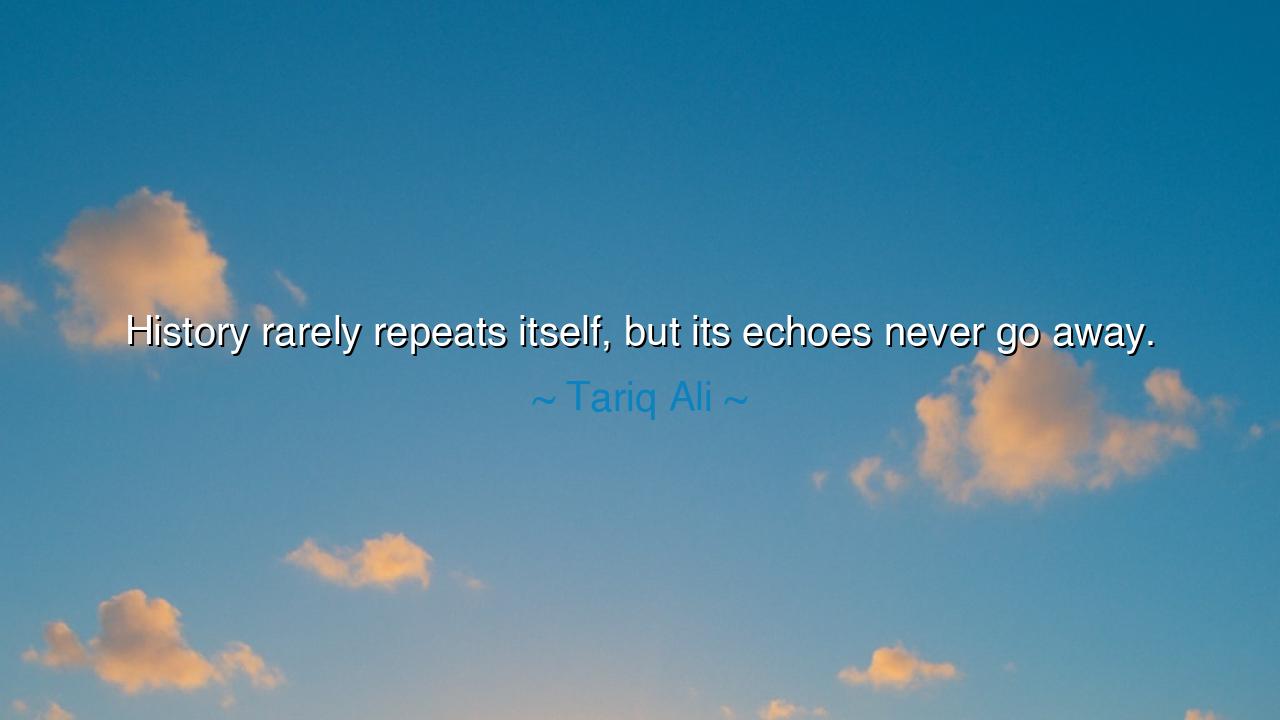
History rarely repeats itself, but its echoes never go away.






The writer, historian, and revolutionary thinker Tariq Ali once said: “History rarely repeats itself, but its echoes never go away.” In this line, simple yet resounding, Ali captures the eternal rhythm of human civilization — the truth that while the same events may not occur twice in identical form, their spirit, their lessons, and their warnings reverberate across the centuries. The tides of history never return to the same shore, but their waves always carry traces of what has come before. Through his words, Ali reminds us that every age lives with the ghosts of its predecessors, and that the wise must learn to listen to the echoes before they become cries.
The origin of this quote lies in Ali’s lifelong contemplation of politics, empire, and revolution. Born in Pakistan and educated in Britain, Tariq Ali witnessed the struggles of the twentieth century — colonial collapse, global conflict, and the endless cycles of rebellion and repression. A historian of power, he saw how nations, blinded by pride, walked the same roads that others had trod before them, never heeding the echoes that filled the air behind them. His words are not merely poetic; they are a warning born of observation. History, he tells us, does not repeat — it rhymes, as Mark Twain once wrote — and those who ignore its rhythm are doomed to stumble to the same tragic beat.
To say that “history rarely repeats itself” is to acknowledge that every era is unique — shaped by its own technology, beliefs, and circumstances. Yet to add that “its echoes never go away” is to understand that the human heart has changed little. The same desires for power, justice, freedom, and revenge pulse through every generation. Empires fall for the same reasons — greed, arrogance, and blindness; revolutions rise from the same sources — hunger, injustice, and hope. The costumes of history change, but the actors remain remarkably familiar. The stage is new, but the play endures.
Consider, for instance, the tragic echo between ancient Rome and the modern empires of our own age. Rome, at its height, ruled the known world, believing itself invincible — a bringer of civilization and order. Yet its expansion drained its treasury, its people grew divided, and its leaders, obsessed with luxury, lost their sense of duty. In the end, the empire crumbled not because of a single battle, but because of moral decay and complacency — the same forces that have undone every great power since. The pattern does not repeat word for word, but its echo can still be heard today, in the halls of nations that wield power without reflection.
These echoes are not merely warnings of doom; they are also whispers of wisdom. When humanity learns from its past, those echoes become teachers. The civil rights movements of the twentieth century drew inspiration from the struggles of the oppressed throughout history. When Nelson Mandela fought against apartheid, he echoed the spirit of the American abolitionists, of Gandhi, of all those who stood for freedom before him. Each generation inherits not only the mistakes of the past, but also its courage. The echoes of bravery and compassion are as enduring as those of folly and pride.
Ali’s quote also speaks to the personal realm, for the history of the world is reflected in the history of the self. How often do we, as individuals, repeat the same patterns of thought and behavior, mistaking them for new experience? The echo of past pain, unlearned, returns again. The echo of wisdom, if ignored, fades into silence. To know the echoes of one’s own history — to face them honestly — is the beginning of growth. So it is with nations, and so it is with the soul.
Let this, then, be the lesson: that history is not a dead chronicle, but a living voice that speaks to those who listen. The wise man does not dismiss its echoes as noise; he discerns their meaning. When you see injustice, recall where it has led before. When you witness pride, remember how it has destroyed the mighty. When you glimpse hope, cherish it, for it too is an echo — of humanity’s eternal faith in renewal.
And so, my children of the present age, walk through the corridors of history not as tourists, but as heirs. Listen to the echoes — of glory and ruin, of courage and betrayal — for they are the heartbeat of time itself. Do not seek to escape them, but to learn from them. For while history may never repeat exactly, its echoes will always remain — calling us either to wisdom or to folly, depending on whether we choose to hear.






AAdministratorAdministrator
Welcome, honored guests. Please leave a comment, we will respond soon